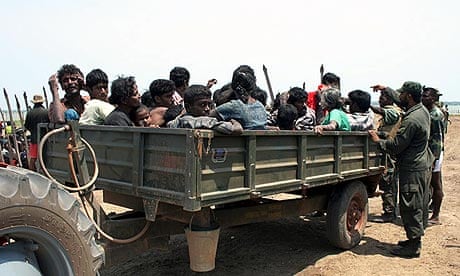The Sri Lankan military today tightened its grip on the last refuge held by Tamil rebels, ignoring calls to end an offensive that aid officials say has unleashed a humanitarian catastrophe. Two army units little more than a mile apart were fighting their way down the coast from the north and up from the south in a pincer movement to encircle the rebels, a military spokesman, Brigadier Udaya Nanayakkara, said.
"Troops are coming along the coastal line, and closing in," Nanayakkara said. "We want to rescue the civilians in 48 hours."
Despite their apparently hopeless position, the Liberation Tigers of Tamil Eelam (LTTE) have vowed not to surrender in their 25-year fight for a separate nation for Sri Lanka's minority Tamils.
As fighting raged, another 1,000 civilians managed to flee rebel-held territory, joining more than 3,700 who had waded across a lagoon to escape the previous day. The rebels fired on those leaving yesterday, killing four and wounding 14 others, according to the brigadier. The International Committee of the Red Cross (ICRC) said heavy fighting meant no help could reach people trapped in a sandy spit on the island's north-eastern coast, where the Sri Lankan government has cornered the Tamil Tigers.
A Red Cross ferry sent to deliver desperately needed food aid and evacuate the wounded had to turn back for the third day yesterday.
The Red Cross said civilians trapped inside the war zone were taking cover in bunkers they had dug in the ground and were finding it even more difficult to get water and food.
"Our staff are witnessing an unimaginable humanitarian catastrophe," the ICRC operations director, Pierre Krahenbuhl, said. "No humanitarian organisation can help them in the current circumstances. People are left to their own devices."
Britain's secretary of state for international development, Douglas Alexander, said he was appalled that the ICRC was unable to continue its operations.
"Since September last year, the ICRC has been the only humanitarian agency allowed to work in the conflict zone, and now even this lifeline has been denied to more than 50,000 people," Alexander said. "Over the last four months alone, the ICRC has evacuated by ship over 14,000 sick and wounded people. Denying this life-saving evacuation and medical treatment is a fundamental violation of international humanitarian law."
The rebels have denied accusations that they are holding civilians as human shields and shooting at those trying to escape the tiny enclave.
Reports that hundreds of civilians were killed in attacks on a makeshift clinic in rebel territory, for which both sides blamed the other, spurred Barack Obama and the UN security council to make their first formal statements on Sri Lanka since the war intensified this year. Government doctors said constant shelling had prompted them to stop working at the clinic yesterday.
About 200,000 civilians have escaped the war zone in recent months and are being held in displacement camps, guarded by the Sri Lankan army. Those that reach the camps are not allowed to leave. Relief groups say children are arriving at the camp in a severely malnourished state, but no therapeutic feeding has started yet. The food ration for adults is not adequate either and there is insufficient space for communal cooking. Christian Aid said that community kitchens designed for 500 people were providing food for between 1,200 and 1,700.
According to a leaked UN document, 7,000 civilians were killed and 16,700 wounded in the fighting from 20 January to 7 May.
The UN secretary general, Ban Ki-moon, has sent his chief of staff, Vijay Nambiar, to Sri Lanka for a second time amid a growing clamour over the carnage. Nambiar is expected to meet top government officials after he arrives tomorrow and push for ways "to secure the safety of the 50,000 to 100,000 civilians remaining inside the combat zone", a UN spokesman, Gordon Weiss, said.
Meanwhile, the US secretary of state, Hillary Clinton, said that the US had raised questions about Sri Lanka's application for a $1.9bn (£1.2bn) IMF loan that the government desperately needs.
"We think that it is not an appropriate time to consider that until there is a resolution," she said in Washington.
